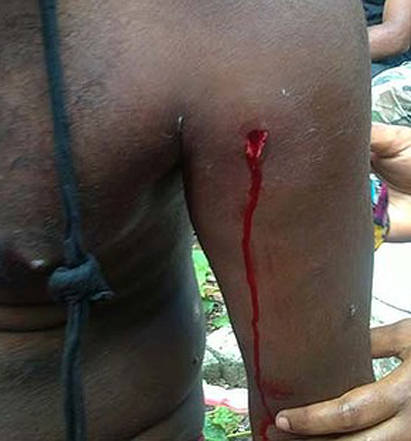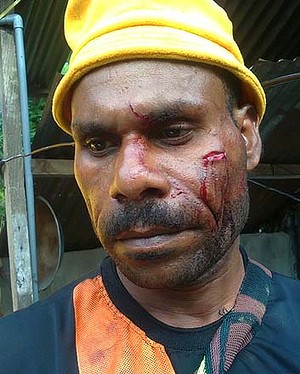
A West Papuan protester with what activists say is a gunshot wound from the Indonesian police crackdown. Image: SMH
Pacific Scoop:
Report – By the Pacific Media Centre news desk
Amnesty International has called on the Indonesian security forces to halt its excessive use of force and firearms when policing demonstrations in the West Papua region.
At least 11 demonstrators were reportedly wounded, four of them suffering
gunshot wounds. A journalist, Oktovianus Pogau, who was
reporting on the
demonstration, alleged he was attacked by the police.

A Papuan with a face wound from the police violence. Image: SMH
The Amnesty International statement said:
On 23 October 2012, around 300 people gathered for a pro-independence demonstration organized by the West Papua National Committee (KNPB) in front of the State University of Papua in Manokwari, West Papua province.
Manokwari sub-district police and military personnel prevented them from proceeding along the road. In response to stones thrown by a few protesters, police opened fire indiscriminately, firing shots into the air and at the crowd.
Some demonstrators alleged that they were beaten by police.
Stone-throwing
Immediate resort to firearms in response to stone-throwing by a minority of demonstrators amounts to excessive use of force in violation of international law.Moreover, the reported beating of demonstrators by police amounts to a violation of the absolute prohibition in international law on torture or other ill-treatment.
At least 11 demonstrators were reportedly injured, four of them suffering gunshot wounds. A journalist, Oktovianus Pogau, who was covering the demonstration, stated that he was attacked by the police.
One of them held him around his throat while another punched him in the face as he tried to retrieve his press card to show them. At least five police officers also reportedly suffered injuries.
Indonesia is party to key international treaties, such as the International Covenant on Civil and Political Rights (ICCPR) and the Convention against Torture and Other Cruel, Inhuman or Degrading Treatment or Punishment (CAT), under which it has explicitly accepted its obligation to respect and protect human rights, including the right to life and the prohibition on torture and other ill-treatment.
These obligations are reflected in the UN Basic Principles on the Use of Force and Firearms by Law Enforcement Officials. These standards stipulate that the use of force should be exceptional, and no force should be used beyond what is strictly necessary and proportionate in the circumstances for the achievement of a legitimate law enforcement objective.
Firearms may be used only as a last resort in defence against an imminent threat of death or serious injury, and only when less extreme means are insufficient.
Defensive equipment
Law enforcement officials should be equipped with a range of means to allow for a differentiated use of force as well as adequate self-defensive equipment such as shields, helmets and body armour to decrease the need to use weapons of any kind.The principles also state that governments must ensure that arbitrary or abusive use of force by law enforcement officials is punished as a criminal offence.
Key elements of these principles are reflected in the Indonesia Police Regulation on the Use of Force (No. 1/2009) which provides that force should use only as a last resort, in proportion to the threat posed, and should be designed to minimise damage or injury.
Amnesty International urges the Indonesian authorities to conduct a prompt, independent and impartial investigation into this incident and to conduct a thorough review of police tactics and the use of force and firearms during policing of demonstrations. Those suspected of arbitrary or abusive use of force or other human rights violations, including those with command responsibility, should be prosecuted in proceedings which meet international standards of fairness, and victims should be
granted reparations.Amnesty International is also concerned that Indonesian security forces continue to deny Papuans their rights to freedom of expression and peaceful assembly.
On 19 October 2012, police units including the Police Mobile Brigade (Brimob) prevented hundreds of people from gathering peacefully at the gravesite of pro-independence leader Theys Eluay in Sentani, Jayapura to commemorate the Third Papuan People’s Congress. The organisers had provided prior notice of the gathering to the authorities.
Rights guaranteed
The rights to freedom of expression and peaceful assembly are guaranteed in Articles 19 and 21 of ICCPR. Moreover, these rights are protected under Indonesia’s Constitution.The authorities must also ensure that journalists can work freely, independently and with full protection from state authorities. Amnesty International remains concerned about ongoing intimidation and attacks against journalists and human rights defenders in Papua and the failure to bring perpetrators to justice.
Over the last week, Papuans have been holding public events to commemorate the first anniversary of the Third Papuan People’s Congress which was held from 17-19 October 2011. At the end of the congress last year, police and military units violently dispersed the gathering.
At least three people were found dead after the event. The National Human Rights Commission (Komnas HAM) found that at least 96 participants had been shot, kicked or beaten by police officers.
Eight police officers involved in the crackdown were only given written warnings after internal disciplinary hearings. To date, there has been no criminal investigation into the events.
Five peaceful political activists were subsequently tried and sentenced to three years’ imprisonment for “rebellion” under Article 106 of the Indonesian Criminal Code.
Amnesty International considers all five men to be prisoners of conscience and calls for their immediate and unconditional release.
